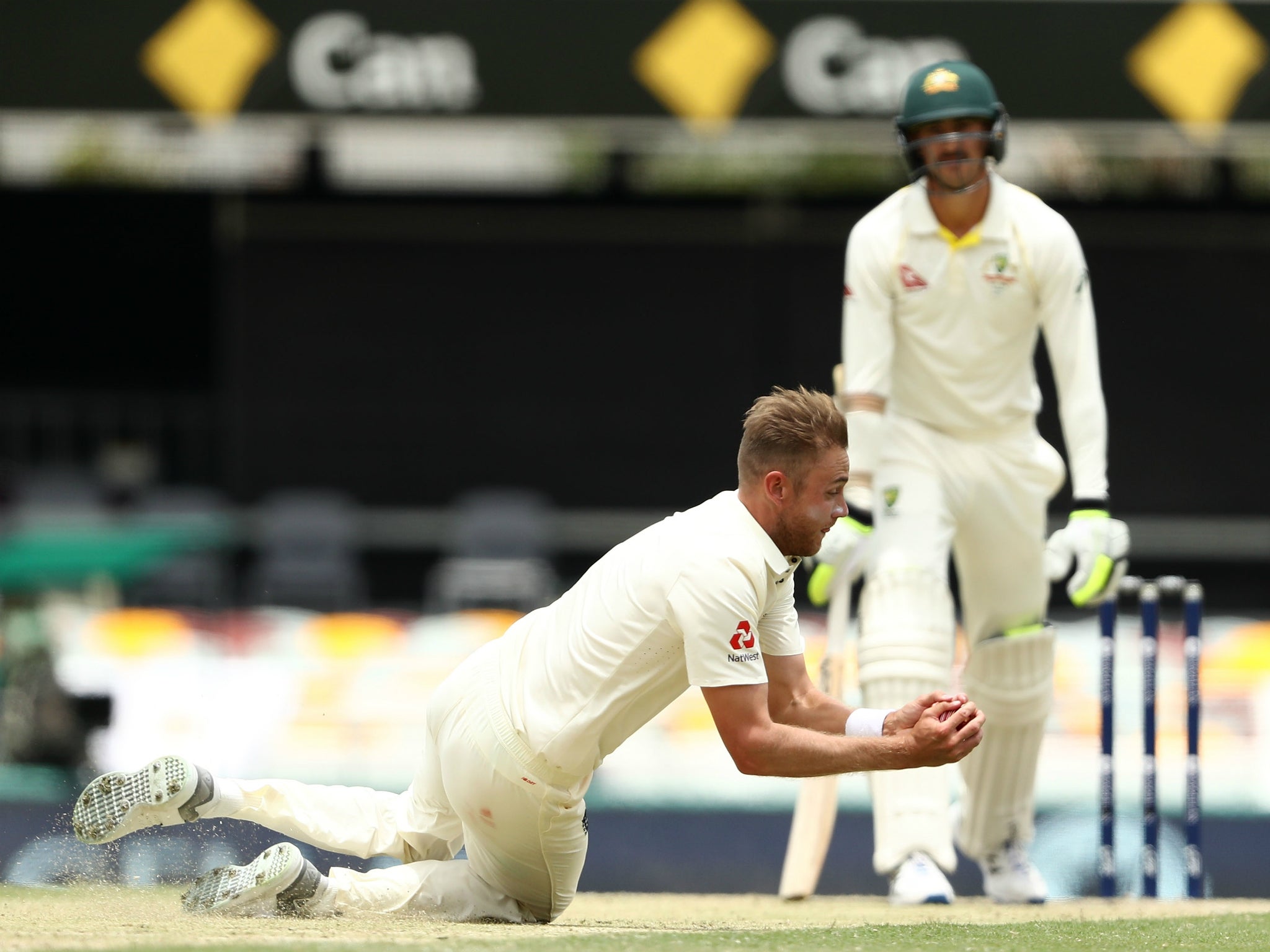Ashes 2017: Steve Smith century puts Australia in the driving seat as England lose early wickets late on
England 302 & 33-2, Australia 328: A captain's innings finally swings the first Test in Australia's favour as Alastair Cook and James Vince fall to leave England fighting to stay in the match
Finally, as the shadows began to lengthen over the Gabba outfield, the first Ashes Test broke. It had threatened to do so several times over the previous days; but every time, it had come back together again like a peloton. Now, though, as the noise of the home crowd swirled like a roaring gale, it was unmistakable. After eight sessions of tense and even cricket, the ninth swung the game Australia’s way.
To discover why, you would point to the defiance of the Australian tail, the razor-sharp edge of Josh Hazlewood, and mostly the brilliance of Steve Smith. Australia’s captain strode from the field with 141 runs by his name, his innings curtailed only by an absence of partners. The first century of this series may yet define it.
After Smith’s star turn, Australia took two quick England wickets to put them firmly in the driving seat. Compounding England’s worries is a potential injury to James Anderson, who stalked grumpily off the field holding his side half an hour into the afternoon session, and was on and off for the rest of the day.
Anderson’s ability to bowl in the fourth innings may well influence Joe Root’s assessment of when - or if – a declaration will be required. History offers mixed messages: no team has ever chased more than 236 to win here, yet only last year Pakistan were set 490 and got agonisingly close. To reach that stage, England will need to bat with guts and skill on a pitch that appears to be quickening.
But back to Smith for a moment, for this was his day. And as he raised his arms in triumph, you struggled to remember a moment of even moderate discomfort. There was that time Jake Ball rattled him on the glove and the ball dropped just safe. Maybe he played and missed a couple of times. Somebody thought they saw him scratching himself at one point: a moral victory of sorts. We were clutching at straws here.

Don’t mistake an untroubled innings for an easy one. This was the slowest of Smith’s 21 Test centuries, and yet few will have given him more satisfaction. England tried to bounce him out and bore him out, spin him out and sledge him out, tempt him and tantalise him, plans upon plans upon plans. They won a hundred tiny victories, only to discover that they added up to no victory at all.
At his very finest vintage, when things are going smoothly, Smith can take flight. Here, he offered fight: masterfully interpreting the conditions, denying himself the drive, bolting himself to the crease for eight and a half hours. In so doing, he demonstrated that his greatness consists of more than a good eye, a quirky technique and natural timing. It is also an ability to take his mind and his body to places other batsmen cannot. England heaved and heaved. But on a pitch that still stubbornly refuses to misbehave, it was like trying to push over a house with your bare hands.

The new ball loomed large as day three began, presenting Root with an immediate problem. To save Anderson and Stuart Broad until it arrived in another 18 overs, or bowl them immediately to try and grab an early wicket? Root gambled, and was rewarded five overs into the day when Shaun Marsh lobbed a Broad leg-cutter straight to Anderson at mid-off.
Once the new cherry arrived, Anderson took four balls to strike, Jonny Bairstow with a marvellous one-handed catch to dismiss Tim Paine. Mitchell Starc, having got off the mark with an astonishing straight six off Broad, offered a simple return catch two balls later. Australia were 209-7, 93 behind, and in danger of conceding their first-innings lead at Brisbane for 14 years.

But still, Smith raged: Australia’s lighthouse, its rock against the crashing waves. The harder England strove to extract him, the deeper he dug in. Root tried everything: six men on the leg-side, no slip, field placings so idiomatic they are yet to be named. Short square cover? Deep silly point? Forward square leg? Ball tried to bounce him. Woakes tried to bounce him. Root stationed himself under the helmet at leg gully, changing the field virtually every ball.
It was Bodyline for the millennial generation, with one important exception: it didn’t work. With Cummins in tow, defending with patience and leaving exceptionally well, Australia sanded their deficit down to a nubbin. “Come on, lads, sixty behind here, sixty behind,” Bairstow shouted. That soon became fifty when Cummins struck Moeen Ali for a humongous six over mid-wicket.

Eventually, Broad served up a slower ball and Smith did what he had essentially refused to do for the past seven hours: drive. He pumped his arms like a man rowing to freedom. The ball sailed through the open gap and disappeared into irrelevance. Smith lifted his helmet to reveal a brow red with sweat. His blonde hair was pinned back with a headband. His fist slammed into his chest. He had spent almost an hour in the 90s. To win an Ashes series you need 100 wickets, and Smith was damned if he was going to be one of them.
Coronation over, Smith freed his arms, hooking Ball for four to put Australia into the lead. Australia’s last three wickets had added 119, but just as importantly, they had added an extra 50 overs to England’s mental and physical burden. For Alastair Cook and Mark Stoneman, a long 20 overs lay ahead.

Well, not for Cook, as it turned out. It was the fourth over of the innings; Starc’s bouncer was perfect; Cook’s swat off his top lip uncontrolled; Starc’s tumbling catch at long leg, exquisite. James Vince edged to second slip, Root was thwacked in the helmet by Starc before he had scored a run, and with another 40 minutes in the day, a disastrous capitulation threatened.

But with only a few alarms, Stoneman and Root held firm: a quietly crucial period, even if there was nothing quiet about it. England are still in this game, just about. They have not played badly, and yet they know now, if they didn’t already, just what a monumental effort it will require to emerge unscathed. England haven’t won at the Gabba for 31 years. Nobody said it was going to be easy.
Join our commenting forum
Join thought-provoking conversations, follow other Independent readers and see their replies
Comments
Bookmark popover
Removed from bookmarks